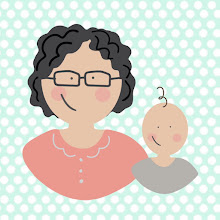1. Be Responsive
This has been one of the most important things in the last (almost) year with Jude. Jay and I are both incredibly responsive to his needs. If he is crying or upset, we will hold him and comfort him. If he is overwhelmed, we will help him recenter. We let him feel his feelings, but he knows that we are always there.
2. Create a Community
Jude has a giant community. I always said that our first born child would be a "baby of the people" because we had so many people rooting for us during our years of infertility. Jude is definitely the baby of the people. He is very social. Jude has three main circles of his community.
Family - We see Jude's family often. Four of his five cousins live less than a 90 second drive away. My family visits often. His Uncle Chris works from our house. The rest of the family makes an effort to stop by and see him. Jude knows that these people are people that he can rely on. They pick him up when he is sad. They play with him. They sing songs to him. Jude trusts them. As an adult, I know how important it is to have people that you rely on, and I feel like the comfort of knowing that there are people there for him always is powerful.
Friends - Jude has a good amount of playdates and social activities every week where he gets to spend time with children of all ages. All of these friends help Jude learn social graces. They also show Jude what it's like to talk, walk, run, and play. I believe without a doubt that Jude's development is positively impacted by all of the friends he gets to interact with weekly.
Weekly Others - I had trouble with what to name this category. Acquaintances seemed too formal. Strangers seemed too informal. This category is maybe the most important because it provides Jude the comfort of knowing that there are people that can support him no matter where he is. They may not snuggle with him or grab him up if he's crying, but they smile at him and talk to him and provide consistency. A good example of a weekly other is Miss. Summer, Jude's tumbling teacher. Miss. Summer is someone Jude sees every week. She's kind of him. She talks to him. He crawls to her and stands with her. He is able to see that there are trusted people everywhere.
3. Nurture Self-Esteem
I love to tell Jude he's brilliant. I clap for Jude. I encourage him. I help him when he's struggling but do my best to let him figure it out himself. I cheer for him when he's working through things. I celebrate when he completes them. I tell him he's the best and I mean it.
I do not for one minute want Jude to ever think that he can't complete something that he puts his mind to. I think all parents want that for their children. There will be things that he cannot do, and that's okay. He will know its okay. Celebrating successes is so important to boost mental health. Not just big successes, but successes in the small steps to reaching the big goal.
Jude, at the tender age of 1, can recognize his own accomplishments, and I think that's just lovely. The other day he did a somersault and then clapped for himself because he just knew it was something to be proud of. That's what nurturing self-esteem means to me. It means giving the tools to Jude to be proud of himself too.
4. Respect Feelings
I spend a lot of time saying to Jude "it's okay, buddy. Feel those feelings". He may be small but he has big, complex feelings just like adults do with the added frustration of not being able to communicate his needs. I try to avoid using the phrase "you're okay" because I feel like it doesn't provide a chance for him to feel what he needs to feel. I replace it with "I see you're upset" or "your feelings are valid".
I also do my best to help him define his feelings. Recently, we have been working on the concept of frustration. As Jude gets less patient in stores or during an activity we need to do, I tell him that I understand he's frustrated but I appreciate how patient he is being. I talk through his feelings with him. I don't try to admonish him for how he feels but instead allow him a space to feel those feelings and come up with a way to move past.
Mental health is something that is very important to me. As a lifelong sufferer of anxiety, I know how easy it can be to fall into negative spaces and spending time from the start to give Jude tools to positively affect his mental health is the most important. I know I'll make mistakes along the way, but I am hoping that giving Jude a solid foundation will give him tools he can use for the rest of his life.














No comments:
Post a Comment